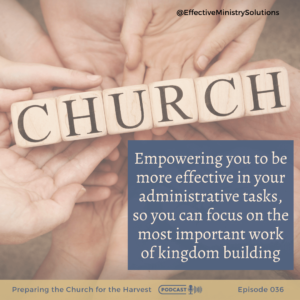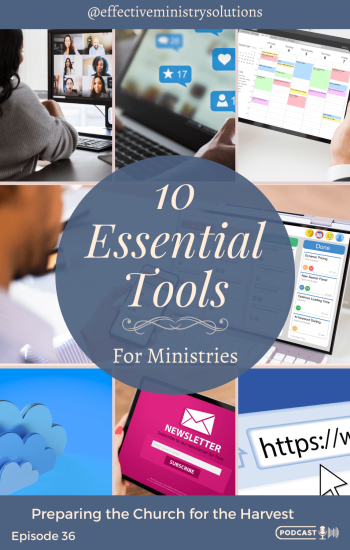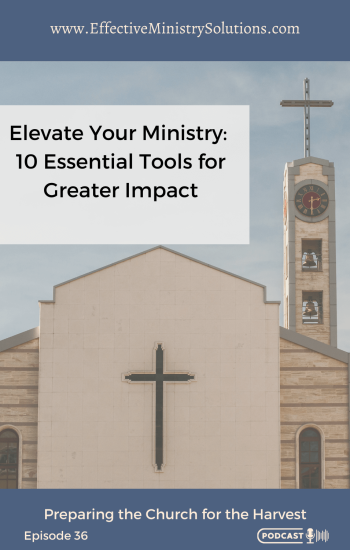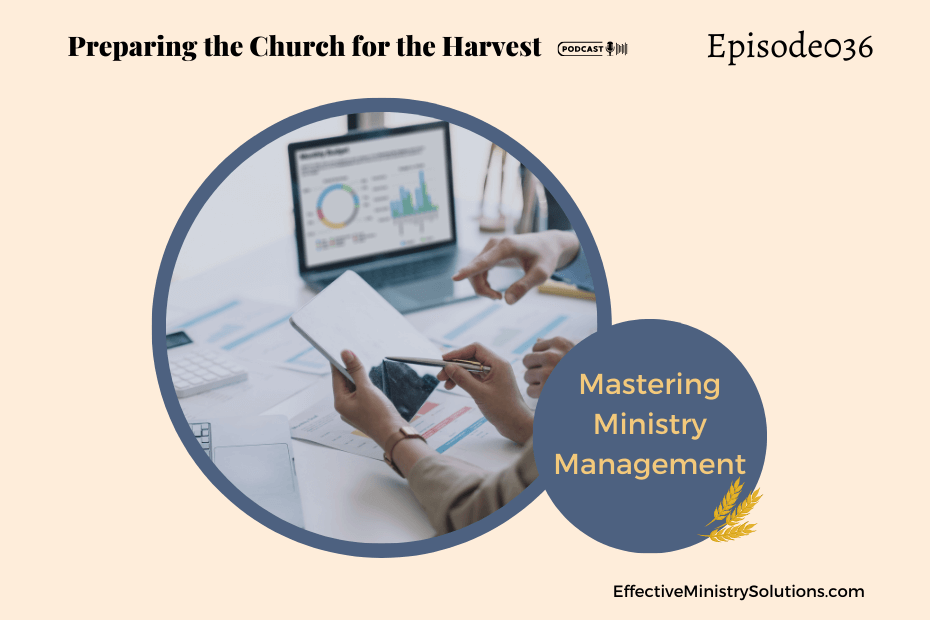Empowering you to be more effective in your administrative tasks, so you can focus on the most important work of kingdom building
1. Website
Your ministry’s website is a powerful tool. A well-designed website can serve as a hub for your community, providing information, resources, and engagement opportunities. In today’s society nearly every new visitor will research your church online before ever setting foot inside the door. Therefore your address, service times, and phone numbers should be clear. Images of services, classes, and events are very helpful.
2. Digital Calendar
Managing your ministry’s events and appointments can be a complex task. Digital calendars can be a LIFESAVER. It can help you streamline every department’s schedule while giving the freedom to staff and leaders to update events and add important information. I mentioned in the last episode that Google Calendar is my personal favorite. There are also some Church Management Software services that give this option as well. We will talk more about that in a bit. What I love about Google Calendar (and this may be available with others as well) is being able to share your calendar with others. So imagine you are the administrative person at the church. You have a main church calendar that has all the special events, staff meetings, and training opportunities. Then the pastor has a separate calendar where he can plug in the times he will be away from the office, counseling sessions that require privacy and confidentiality, and anything else he needs you to know about. Now you as the admin could have your own calendar where you put your own schedule, vacation days, etc. You can view each of these separately or overlay them together. This is a planning person’s dream come true!
You can also integrate a scheduling tool into your calendar as well. This is where you send a link to someone and they can pick an open spot to meet with you. You can hear more about that in Episode 35.

3. Online File Storage & Sharing
Centralized document management is a game-changer for ministries. It is convenient, efficient, and organized. Say goodbye to scattered documents and having to dig through file cabinets! There are many systems to choose from but if you are already using Gmail or Google Calendar then you also have access to Google Drive. This is a great place to start if you don’t have a lot to store. There is a free plan and you can upgrade at any time if you need more storage space. You can also share documents with others. For example, you could share an agenda, financial reports, and ministry reports with a team before a meeting. If you have policies, procedures, or other documents several people need access to, you can create a folder to house all of these documents and share the entire folder with the staff or team.
4. Virtual Meetings
In 2020, everyone got a crash course in conducting and attending virtual meetings. Zoom quickly became a household function. During this time, ministries realized what an asset this piece of technology is. Especially for ministries that extend beyond one community. It is a great way to have face-to-face meetings without leaving the comfort of your home or office. This meeting platform also condensed the time it took to conduct a meeting. Although Zoom has become the most common platform, you can do a quick Google search to find other options. Not only is this a great tool to use within the ministry, but also a wonderful way to collaborate with other leaders and ministries.

5. Social Media
This one might be a bit controversial still, however, social media is a powerful tool for ministry outreach. This is much information out there on how to manage social media. You can learn strategies for engaging and growing your ministry’s online presence, complete with examples, sample templates, and tips for reaching the demographics in your area. There are even “social media managers” who you can hire to help with this. If your church does not have some type of social media presence, you are missing out on the best free advertisement and marketing strategy.
6. Digital Newsletters and Email Marketing
Email marketing remains a key channel for engaging your congregation and supporters. This is a great way to communicate upcoming events, share words of testimony, and encourage the flock. There are several email platforms available and this is something else that a church management software might provide. Two common stand-alone email platforms are MailChimp and Constant Contact. This is a great way to generate a digital newsletter. This is another way to engage with your congregation and help them feel connected.

7. Project Management Software
Project and team management are crucial for efficient ministry operation. My favorite tool for this is Trello. I talked about how I personally use Trello in the last episode if you want to jump back and listen to it. Ministries can use this to track visitor follow-up, enlist and train volunteers, and plan the upcoming staff party or Christmas Play. You can share your “Trello Boards” with others on your team so that you can collaborate together. You can assign tasks to people on your team and check off when things get done on the list. You can also assign due dates and set reminders. I have used this method for planning several conferences and women’s retreats. There, of course, are a plethora of other systems available that you can check out. Keeping projects and teams on track is a challenging task and I am all for finding ways to do that more efficiently. In fact, several years ago, I created the “Ministry Management Binder”. I have a physical printable version that can be put in a binder and I have a digital version on a Trello Board. Or you can get both at a discounted price.
8. Online Giving
It is a fact that churches that had an online giving option during the Covid pandemic saw less of a decline in finances than those who did not. Online giving has become more and more accepted as most of the younger generation pays their bills online and doesn’t carry cash or checks. There are many options for receiving offerings online and I am not going to recommend one over another. I will say keep it simple. Choose a platform that is easy to use for the individuals and for the church. If it integrates with your accounting software that is a huge plus. This may require a little research to pick the one that fits best. I would start by asking what others in your community and organization have had success with. There is also a feature called text-to-give. You can do a quick search to find out more about that as well.
9. Accounting Software
Effective financial management is a cornerstone of ministry success. Using an accounting software can make life so much better. When I first started out as a church secretary (more years ago than I care to admit) it was all on paper! I transitioned to an Excel spreadsheet and eventually switched to QuickBooks. Now there are systems created just for churches and ministries. Let me just say that when I started out, it took me DAYS to tally up all the end-of-year contribution statements. Now they can be printed off in minutes! Having an efficient system will allow you so much more time to do more productive work. Now, I mentioned QuickBooks but there are several systems available that you can choose from.

10. Church Management Software
Last but definitely not least is an all-in-one Church Management Software. These systems provide a comprehensive solution for ministry administration. Combining several of the aforementioned tools can streamline administrative tasks and enhance member engagement. These can offer a combination of calendars, file storage, email marketing, accounting software, online giving, and project management. Each system is different and usually based on the needs and size of the ministry. Here is a list of the 10 Best Church Management Systems for Small Churches published by theleadpastor.com.
Listen here or subscribe on your favorite podcast app:
Your Work IS Important!
We have explored 10 tools that can supercharge your ministry and its effectiveness. Leveraging these tools will enable you to streamline your administrative tasks, leaving you with more time to focus on the most critical aspect of ministry—kingdom building.
In such uncertain times, it is imperative that we stay on task and be about the Father’s business. Administrative tasks may seem unimportant to many, however, it is like a well-oiled machine. When things don’t run smoothly, systems begin to break down. So if you are in an administrative position, I want you to remember that this IS a calling. Not everyone can do what you are doing. It IS important. You ARE needed. If you can get organized and create systems you are helping to keep things running smoothly.
*This site contains affiliate links to products. We may receive a commission for purchases made through these links. It doesn’t cost you any extra but it does help us offset the cost of operating so we can continue to offer more great content!


